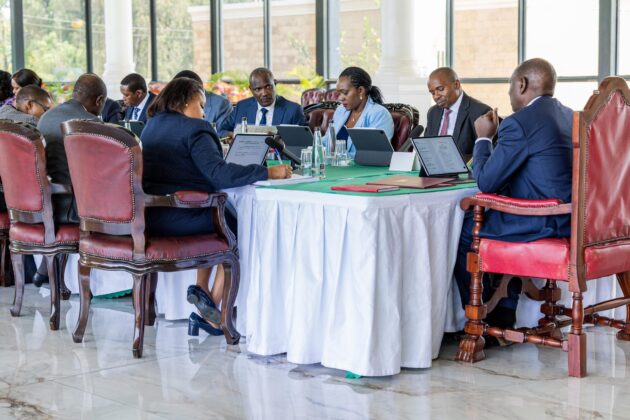
Kenya’s economy has stabilised, growing stronger » Capital News
NAIROBI, Kenya, Nov 15 – President William Ruto chaired a Cabinet meeting at State House, Nairobi, Thursday where it was briefed on the impressive stabilisation of the macroeconomic situation in the country following two years of deliberate fiscal management measures.
The Kenyan economy continues its strong recovery from past global and domestic challenges, achieving robust growth.
Members were informed that inflation, which reflects the increase in prices over time, had declined substantially to 2.7 per cent last month, down from a high of 9.6 per cent in September 2022.
This is the lowest inflation rate since 2007, during President Mwai Kibaki’s tenure, and aligns with the target set in the Kenya Kwanza Manifesto.
Consequently, the prices of various types of food, particularly maize, beans, and peas, have decreased over the past year.
A 2kg packet of maize, which was retailing at KSh176 a year ago, is now selling at KSh124.
The Cabinet was also informed that foreign exchange reserves at the Central Bank are at an all-time high of $9.5 billion, an increase of $2.4 billion, equivalent to 4.4 months of import cover.
The meeting was further briefed that the country’s economic growth has remained steady and ranks among the highest globally, at 5.6 per cent in 2023, with an estimated growth of 5 percent this year and 5.6 per cent next year.
Regarding the exchange rate, Cabinet noted that the shilling has stabilised at KSh129 from a high of KSh162, after appreciating by nearly 20 per cent earlier in the year. This appreciation has led to reduced external debt service.
Interest rates are also beginning to decrease, which will result in lower domestic interest rate costs, creating fiscal space.
On the revenue side, the Kenya Revenue Authority’s tax collections have grown by double digits. Tax revenue increased by 11.5 per cent in the year to June 2024.
The food situation in the country, the Cabinet was informed, is stable due to the government’s subsidized fertilizer program and other support measures extended to farmers.
As a result, most households can access basic food requirements. Currently, the country has 95.2 million 50kg bags of maize, 8.8 million bags of beans, 10.4 million bags of wheat, and 2.1 million bags of rice in stock.
On sugar, the meeting noted that Kenya has, for the first time, produced enough to meet local demand. As a result, no sugar will be imported this year.
This achievement is due to subsidised fertilizer provided to farmers and improved management of the sector.
In a briefing on labour migration, the Cabinet was informed that 105,367 Kenyans have secured jobs abroad since July 2023, while 16,943 have been cleared for opportunities since January this year.
Kenya has signed bilateral labour agreements with Germany and Austria. Other countries identified by the Ministry of Labour as destinations for Kenyan workers include Australia, Qatar, Canada, Saudi Arabia, Oman, the UAE, the United Kingdom, Kuwait, and Northern Ireland.
These opportunities span professional, skilled, and unskilled jobs, including positions for nurses, aged-care workers, and teachers in science, mathematics, English, and physical education.
At the meeting, the Cabinet was informed that the Ministry of Labour has organised job recruitment drives in every county over the coming weeks.
The Cabinet also received an extensive briefing on the Social Health Insurance Fund, covering both successes and challenges.
It was informed that the NHIF debt to health facilities is increasingly being settled. Over the past month, KSh5 billion has already been paid to hospitals, including faith-based, public, and private hospitals, to clear historical pending bills.
The meeting was also told that more than 14 million Kenyans have registered with the Social Health Authority.
The Cabinet also approved the upgrading of five Technical Training Institutes to National Polytechnics.
These are: Michuki TTI, Mitunguu TTI, Ol’ lessos TTI, Nairobi TTI, and Friends College of Research and Technology in Kaimosi. National polytechnics will now increase from 23 to 28.
Further, Cabinet approved the transfer of Amboseli National Park to the County Government of Kajiado.
Moreover, it approved Kenya’s signature and ratification of the Agreement Under the United Nations Convention on the Law of the Sea on the Conservation and Sustainable Use of Marine Biological Diversity of Areas Beyond National Jurisdiction.
President Ruto also welcomed Deputy President Kithure Kindiki to his first Cabinet meeting as Deputy President and congratulated him on his nomination and appointment.
About The Author